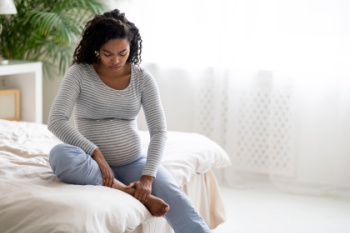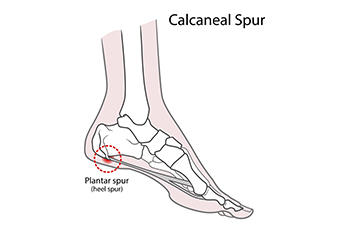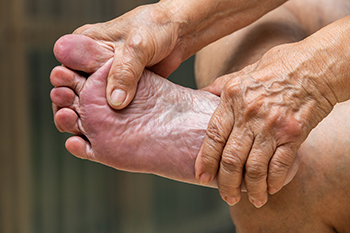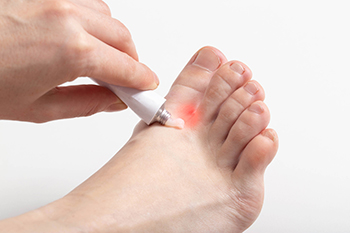Items filtered by date: September 2024
Swollen Feet During Pregnancy

Swollen feet are a common discomfort during pregnancy, often caused by the body retaining extra fluid and pressure from the growing uterus. This extra pressure can affect blood flow, leading to fluid buildup in the lower extremities. Swelling of the feet and ankles is typically more noticeable later in the day or during advanced stages of pregnancy. While this is usually harmless, it can become uncomfortable and limit mobility. It is important to monitor sudden increases in swelling, as they may be a sign of a more serious condition, such as pre-eclampsia, which requires immediate medical attention. A podiatrist can assess your feet, offer guidance on managing discomfort, and suggest ways to alleviate pressure on the feet and ankles. This medically trained foot doctor can also evaluate whether the swelling is part of a typical pregnancy experience or if further intervention is necessary. If pregnancy is causing swollen feet and ankles, it is suggested that you make an appointment with a podiatrist for an exam, diagnosis, and treatment options.
Pregnant women with swollen feet can be treated with a variety of different methods that are readily available. For more information about other cures for swollen feet during pregnancy, consult with Kenneth Donovan, DPM from Advanced Care Foot and Ankle. Our doctor will attend to all of your foot and ankle needs.
What Foot Problems Can Arise During Pregnancy?
One problem that can occur is overpronation, which occurs when the arch of the foot flattens and tends to roll inward. This can cause pain and discomfort in your heels while you’re walking or even just standing up, trying to support your baby.
Another problem is edema, or swelling in the extremities. This often affects the feet during pregnancy but tends to occur in the later stages.
How Can I Keep My Feet Healthy During Pregnancy?
- Wearing orthotics can provide extra support for the feet and help distribute weight evenly
- Minimize the amount of time spent walking barefoot
- Wear shoes with good arch support
- Wear shoes that allow for good circulation to the feet
- Elevate feet if you experience swelling
- Massage your feet
- Get regular, light exercise, such as walking, to promote blood circulation to the feet
If you have any questions please feel free to contact our office located in Charleston, SC . We offer the newest diagnostic and treatment technologies for all your foot and ankle needs.
Symptoms of Heel Spurs

Heel spurs can cause significant discomfort and disrupt your daily routine. A common symptom is a sharp, knife-like pain in the heel when you first stand up in the morning, which can make getting out of bed challenging. Throughout the day, this pain often transforms into a dull ache, while inflammation and swelling at the front of the heel become noticeable. You might also feel heat radiating from the affected area and observe a small, visible bone-like protrusion under the heel. The heel's bottom may be tender to touch, making walking barefoot particularly uncomfortable. If you are experiencing these symptoms, it is important to seek professional help. A podiatrist can provide a precise diagnosis and effective treatment options tailored to your needs. Do not let heel spurs keep you from your daily activities. It is suggested you schedule an appointment with a podiatrist to get back on your feet comfortably.
Heel spurs can be incredibly painful and sometimes may make you unable to participate in physical activities. To get medical care for your heel spurs, contact Kenneth Donovan, DPM from Advanced Care Foot and Ankle. Our doctor will do everything possible to treat your condition.
Heels Spurs
Heel spurs are formed by calcium deposits on the back of the foot where the heel is. This can also be caused by small fragments of bone breaking off one section of the foot, attaching onto the back of the foot. Heel spurs can also be bone growth on the back of the foot and may grow in the direction of the arch of the foot.
Older individuals usually suffer from heel spurs and pain sometimes intensifies with age. One of the main condition's spurs are related to is plantar fasciitis.
Pain
The pain associated with spurs is often because of weight placed on the feet. When someone is walking, their entire weight is concentrated on the feet. Bone spurs then have the tendency to affect other bones and tissues around the foot. As the pain continues, the feet will become tender and sensitive over time.
Treatments
There are many ways to treat heel spurs. If one is suffering from heel spurs in conjunction with pain, there are several methods for healing. Medication, surgery, and herbal care are some options.
If you have any questions feel free to contact our office located in Charleston, SC . We offer the latest in diagnostic and treatment technology to meet your needs.
We Can Treat Your Foot or Ankle Pain
Foot Care For the Elderly

Elderly foot care is essential for maintaining mobility and preventing complications as people age. Older adults often face issues, such as reduced circulation, weakened muscles, and diminished sensation. These can lead to problems like bunions, hammertoes, and painful calluses. Additionally, diabetes can worsen foot issues, increasing the risk of ulcers, infections, and falls. Proper foot care includes regular inspection for cuts, sores, or changes in skin color, as well as maintaining good hygiene and nail care. Wearing supportive, well-fitting shoes can help prevent pressure sores and provide stability. Regular foot exercises and maintaining a healthy weight can also alleviate discomfort and enhance mobility. To address foot problems effectively and prevent serious complications, it’s suggested you make an appointment with a podiatrist. Their expertise in elderly foot care ensures a comprehensive approach to keeping your feet healthy and functional.
Proper foot care is something many older adults forget to consider. If you have any concerns about your feet and ankles, contact Kenneth Donovan, DPM from Advanced Care Foot and Ankle. Our doctor can provide the care you need to keep you pain-free and on your feet.
The Elderly and Their Feet
As we age we start to notice many changes in our body, but the elder population may not notice them right away. Medical conditions may prevent the elderly to take notice of their foot health right away. Poor vision is a lead contributor to not taking action for the elderly.
Common Conditions
- Neuropathy – can reduce feeling in the feet and can hide many life-threatening medical conditions.
- Reduced flexibility – prevents the ability of proper toenail trimming, and foot cleaning. If left untreated, it may lead to further medical issues.
- Foot sores – amongst the older population can be serious before they are discovered. Some of the problematic conditions they may face are:
- Gouging toenails affecting nearby toe
- Shoes that don’t fit properly
- Pressure sores
- Loss of circulation in legs & feet
- Edema & swelling of feet and ankles
Susceptible Infections
Diabetes and poor circulation can cause general loss of sensitivity over the years, turning a simple cut into a serious issue.
If you have any questions please feel free to contact our office located in Charleston, SC . We offer the newest diagnostic and treatment technologies for all your foot and ankle needs.
Facts About Athlete’s Foot

Athlete's foot, medically known as tinea pedis, is a fungal infection that affects the skin on the feet. It commonly manifests in three types, interdigital, moccasin, and vesicular. Interdigital occurs between the toes, moccasin causes scaling on the soles, and vesicular causes fluid-filled blisters. Athlete's foot is caused by fungi that thrive in warm, moist environments, like locker rooms or damp shoes. Symptoms typically include itching, redness, and peeling of the skin, often accompanied by a burning sensation. The infection can spread to other areas of the body if not treated promptly. Maintaining good foot hygiene, keeping feet dry, and wearing breathable footwear can help prevent athlete's foot. If you have an athlete’s foot infection, it is suggested that you promptly visit a podiatrist who can effectively treat this highly contagious condition.
Athlete’s foot is an inconvenient condition that can be easily reduced with the proper treatment. If you have any concerns about your feet and ankles, contact Kenneth Donovan, DPM from Advanced Care Foot and Ankle. Our doctor will treat your foot and ankle needs.
Athlete’s Foot: The Sole Story
Athlete's foot, also known as tinea pedis, can be an extremely contagious foot infection. It is commonly contracted in public changing areas and bathrooms, dormitory style living quarters, around locker rooms and public swimming pools, or anywhere your feet often come into contact with other people.
Solutions to Combat Athlete’s Foot
- Hydrate your feet by using lotion
- Exfoliate
- Buff off nails
- Use of anti-fungal products
- Examine your feet and visit your doctor if any suspicious blisters or cuts develop
Athlete’s foot can cause many irritating symptoms such as dry and flaking skin, itching, and redness. Some more severe symptoms can include bleeding and cracked skin, intense itching and burning, and even pain when walking. In the worst cases, Athlete’s foot can cause blistering as well. Speak to your podiatrist for a better understanding of the different causes of Athlete’s foot, as well as help in determining which treatment options are best for you.
If you have any questions please feel free to contact our office located in Charleston, SC . We offer the newest diagnostic and treatment technologies for all your foot and ankle needs.

